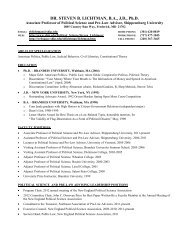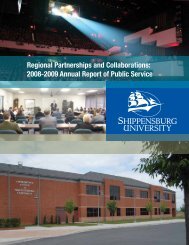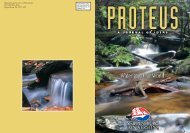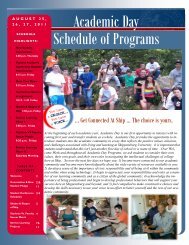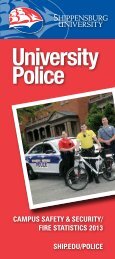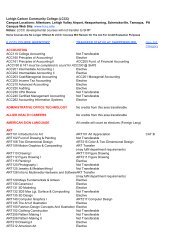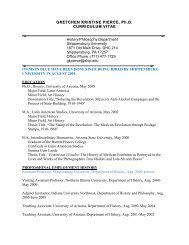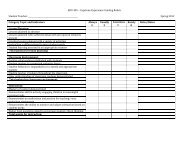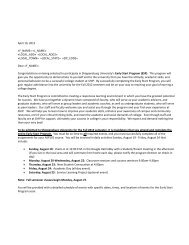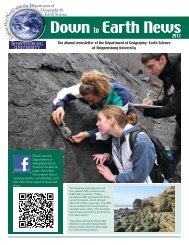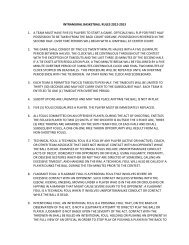Graduate Catalog - Shippensburg University
Graduate Catalog - Shippensburg University
Graduate Catalog - Shippensburg University
Create successful ePaper yourself
Turn your PDF publications into a flip-book with our unique Google optimized e-Paper software.
<strong>Shippensburg</strong> <strong>University</strong>BIO423 Plant Pathology (3 crs.)Basic course in plant pathology considers the major general groupsof plant diseases together with specific representative diseases foreach group and methods for their control. Three hours lecture/week.Prerequisites: BIO162 and BIO230.BIO425 Biota of Florida (2 crs.)Seminar/field course deals with the biology of warm temperate andsubtropical Florida including vegetation, fauna, geology, history, andeconomy. Offered spring semester of even numbered years, it requiresa single weekly one hour class meeting plus an intensive 10-day fieldtrip to parks, natural area, and refuges in Florida over spring break.Field trip costs for the student include food, transportation, entranceand camping fees. (Offered spring semester, even years).BIO430 Principles of Evolution (3 crs.)Introduction to evolutionary principles, their applications, and theappropriate literature. Major topics include the history of evolutionaryconcepts, the species and speciation processes, phylogenetic patternsand their reconstruction, classification, biogeography, extinction,and biological nomenclature. Three hours lecture/week. Prerequisites:BIO161, BIO162, and BIO260. (Offered spring semester).BIO442 Aquatic Ecology (3 crs.)Examines the ecology habitats including streams, springs, lakes,wetlands and estuaries. Lectures explore the physical, chemical, andbiological forces shaping aquatic systems, with an emphasis on theecology and conservation of freshwater organisms and habitats. Fieldand laboratory work includes sampling techniques, characterizationof aquatic habitats, and identification of aquatic organisms. Aweekend field trip is required. Two hours lecture and three hours lab/week. Prerequisites: BIO162, or graduate standing; Ecology and one yearof chemistry strongly recommended. <strong>Graduate</strong> students enrolled in this classwill be required to complete additional course requirements.BIO444 Conservation Biology (3 crs.)Applies the principles of population ecology, population genetics,biogeography, animal behavior, and paleobiology to the maintenanceof global diversity and natural systems. Research theory is applied toconservation policy and management decisions. Two periods lectureand two periods lab/discussion per week. Includes midweek andweekend field trips. Prerequisite: college course in ecology or wildlife biology.(Offered spring semester, even years).BIO448 Field Botany and Plant Taxonomy (3 crs.)Deals with principles of classification and systematics of vascularplants, with emphasis on local plant communities. Field trips and laboratoriesdevelop skill in the use of technical and popular identificationmanuals. Library readings develop familiarity with principles andliterature of plant systematics and ecology. Memorization of selected,local species required. Field trips include several local excursions plusa weekend trip to natural areas in the Pennsylvania and DelmarvaPeninsula. Two hours lecture and two hours lab/week. Prerequisite:BIO100 or BIO162 (Offered fall semester).BIO450 Endocrinology (3 crs.)Study of the glands of internal secretion and their biochemical andphysiological role in the development, growth, metabolism, homeostasis,and reproduction of animals. Three hours lecture/week.Prerequisite: BIO350 or BIO351 (offered fall semester).BIO461 Techniques in Biotechnology (3 crs.)Provides hands-on experience with standard molecular biology andimmunological techniques commonly used in industrial and academiclaboratories. Methods include immunoblotting methods, ELISA,isolation and analysis of DNA and RNA, protein purification, andgene cloning techniques. One hour lecture and four hours lab/week.Prerequisite: BIO385 or BIO418 or CHM301. (Offered spring semester.)BIO485 Biological Microscopy and Imaging (3 crs.)Covers principles and techniques in macrophotography, lightmicroscopy, especially microphotography and videography, and scanningelectron microscopy (SEM). Includes specimen handling andpreparation including basic theory and practice in fixation, dehydration,dark room techniques, and computer imaging. Perform basicmaintenance and alignment of the SEM. Research project required.<strong>Graduate</strong> students required to complete additional course requirements.Two hours lecture and two hours lab/week. Prerequisite: Upperdivision or graduate standing. (Offered spring semester, odd years).BIO491 Selected Topics (1-3 crs.)Opportunity to offer courses in areas of departmental major interestnot covered by regular courses.BIO494 Field Research Techniques (3 crs.)Overview of methods for investigating biological field problems.Students will learn to use a variety of techniques in field conditions.Collections, analyses, and interpretation of data will be emphasized.Methods applied in current professional literature will be discussed.<strong>Graduate</strong> students will be required to complete an independentproject culminating in a written report. Prerequisite: <strong>Graduate</strong> or upperdivision standing. (Offered summers only).BIO514 Aquatic Entomology (3 crs.)Rigorous course concentrating on the taxonomy and morphologyof the insects having representatives spending all or part of their lifecycles in aquatic environments. Intensive field and laboratory workcenters on collection, classification of representative types, and studiesof ecological roles of various aquatic habitats. Prerequisite: a previousentomology course, graduate status, or permission of instructor.BIO515 How to Research, Write, and Publish a Scientific Paper (1 cr.)Introduces biology graduate students to techniques and skills requiredto successfully research, write, and publish scientific papers. Topics include:What is research; Why publish; experimental design; literaturesearches; preparing a manuscript; preparing tables and figures; what,how, and where to submit; the editorial review process; and oral andposter presentation of research papers.BIO520 Plant Ecology (3 crs.)Explores structure and function of natural plant communities and exposesstudents to methods of field sampling and data analysis in plantcommunity ecology. Includes review of current primary literature inplant ecology. Prerequisite: BIO242.BIO541 Ecosystems (3 crs.)Explores pattern and process in ecosystem, emphasizing elementalcycling and energy flow in and across terrestrial and aquatic ecosystems,and interfaces with biotic communities. Will include methodsand approaches in ecosystem ecology and review of primary literature.Prerequisite: BIO242.BIO547 Wetland Ecology (3 crs.)Wetlands structure and function are studied as a unit to better understandthe fragility of this invaluable ecosystem. Includes classification,delineations, wetlands protection techniques, and current status ofwetlands, with field study of most wetland types of the Mid-Atlanticregion. Offered alternate summers.BIO555 Comparative Environmental Physiology (3 crs.)Considers comparative aspects of life functions in selected representativesof the animal kingdom with respect to their different environments.Prerequisite: BIO351 or BIO350 or permission of instructor.BIO558 Microbial Ecology (3 crs.)Examines the interactions of bacteria, yeasts and protozoans in theenvironment. The role of each type of microorganism in degradationand nutrient recycling is explored in the laboratory and in the field.Topics include soil, water, and gut microbiology; microorganisms asgeochemical agents; microbial succession; and seasonal variation inmicrobial populations. Prerequisite: BIO220.72



